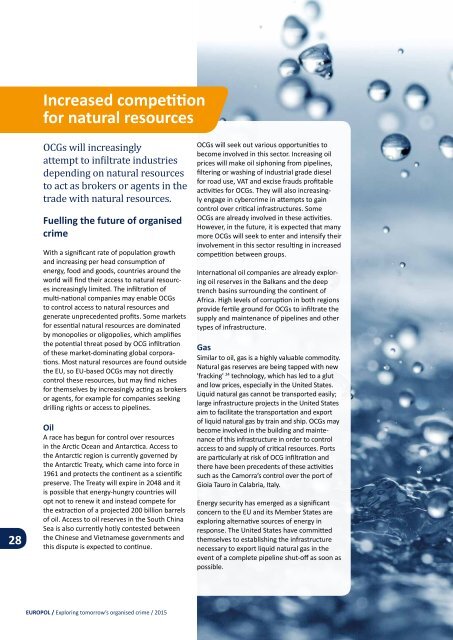eu-europol-org-crime-report
eu-europol-org-crime-report
eu-europol-org-crime-report
Create successful ePaper yourself
Turn your PDF publications into a flip-book with our unique Google optimized e-Paper software.
Increased competition<br />
for natural resources<br />
28<br />
OCGs will increasingly<br />
attempt to infiltrate industries<br />
depending on natural resources<br />
to act as brokers or agents in the<br />
trade with natural resources.<br />
Fuelling the future of <strong>org</strong>anised<br />
<strong>crime</strong><br />
With a significant rate of population growth<br />
and increasing per head consumption of<br />
energy, food and goods, countries around the<br />
world will find their access to natural resources<br />
increasingly limited. The infiltration of<br />
multi-national companies may enable OCGs<br />
to control access to natural resources and<br />
generate unprecedented profits. Some markets<br />
for essential natural resources are dominated<br />
by monopolies or oligopolies, which amplifies<br />
the potential threat posed by OCG infiltration<br />
of these market-dominating global corporations.<br />
Most natural resources are found outside<br />
the EU, so EU-based OCGs may not directly<br />
control these resources, but may find niches<br />
for themselves by increasingly acting as brokers<br />
or agents, for example for companies seeking<br />
drilling rights or access to pipelines.<br />
Oil<br />
A race has begun for control over resources<br />
in the Arctic Ocean and Antarctica. Access to<br />
the Antarctic region is currently governed by<br />
the Antarctic Treaty, which came into force in<br />
1961 and protects the continent as a scientific<br />
preserve. The Treaty will expire in 2048 and it<br />
is possible that energy-hungry countries will<br />
opt not to renew it and instead compete for<br />
the extraction of a projected 200 billion barrels<br />
of oil. Access to oil reserves in the South China<br />
Sea is also currently hotly contested between<br />
the Chinese and Vietnamese governments and<br />
this dispute is expected to continue.<br />
OCGs will seek out various opportunities to<br />
become involved in this sector. Increasing oil<br />
prices will make oil siphoning from pipelines,<br />
filtering or washing of industrial grade diesel<br />
for road use, VAT and excise frauds profitable<br />
activities for OCGs. They will also increasingly<br />
engage in cyber<strong>crime</strong> in attempts to gain<br />
control over critical infrastructures. Some<br />
OCGs are already involved in these activities.<br />
However, in the future, it is expected that many<br />
more OCGs will seek to enter and intensify their<br />
involvement in this sector resulting in increased<br />
competition between groups.<br />
International oil companies are already exploring<br />
oil reserves in the Balkans and the deep<br />
trench basins surrounding the continent of<br />
Africa. High levels of corruption in both regions<br />
provide fertile ground for OCGs to infiltrate the<br />
supply and maintenance of pipelines and other<br />
types of infrastructure.<br />
Gas<br />
Similar to oil, gas is a highly valuable commodity.<br />
Natural gas reserves are being tapped with new<br />
'fracking' 24 technology, which has led to a glut<br />
and low prices, especially in the United States.<br />
Liquid natural gas cannot be transported easily;<br />
large infrastructure projects in the United States<br />
aim to facilitate the transportation and export<br />
of liquid natural gas by train and ship. OCGs may<br />
become involved in the building and maintenance<br />
of this infrastructure in order to control<br />
access to and supply of critical resources. Ports<br />
are particularly at risk of OCG infiltration and<br />
there have been precedents of these activities<br />
such as the Camorra’s control over the port of<br />
Gioia Tauro in Calabria, Italy.<br />
Energy security has emerged as a significant<br />
concern to the EU and its Member States are<br />
exploring alternative sources of energy in<br />
response. The United States have committed<br />
themselves to establishing the infrastructure<br />
necessary to export liquid natural gas in the<br />
event of a complete pipeline shut-off as soon as<br />
possible.<br />
EUROPOL / Exploring tomorrow’s <strong>org</strong>anised <strong>crime</strong> / 2015


